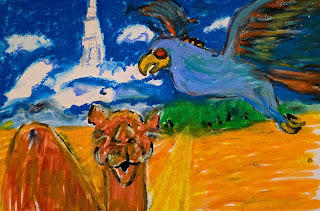“Every angel is
terrible,” Rilke says in his Duino Elegies, "and yet, alas, I invoke you,
almost deadly birds of the soul.” Wings - and the resemblance to birds - is
what most of us first associate with angels, though the earliest angels to
appear in Judeo-Christian texts are wingless.
This morning a friend sent me video of a recitation of a French translation of
Pushkin's poem "The Prophet" in which a desperate spiritual wanderer,
thirsting in the desert, meets a six-winged angelic being, one of the high order
of seraphim. His eyes are changed to those of a young eagle. In his ears he
hears "the shudderings of heaven" and the "huge wingbeats of
angels". His heart is ripped out and replaced with a flaming coal
and - utterly changed - he can fulfill his calling as a prophet.
Pushkin was inspired by the Old Testament (especially Isaiah 6: 9-13), Rilke by
the angels of Islam he had read about in a French biography of Muhammad. I am
inspired by their winged poetry to post the illustration I made this week from
one of my many dream visions of the "almost deadly birds of the
soul".
March 13, 2024
From a lucid dream that unfolded spontaneously in the hypnopompic zone.
"I wish to see with your eyes," says the angel
The camel appears first, pushing its nose up
close. I see a vast expanse of desert and a city of verdant gardens beyond. I
think of journeys I have made along the path of Gimel (the Camel), the path of
the High Priestess in Kabbalistic Tarot. Why not?
I don’t have to mount the camel. As soon as I
consent to the journey, I am looking at the sculpted profile of a mythic bird,
its curved beak sharply defined against a deep blue sky. It reminds me of the
homa birds on capitals at Persepolis, as I have seen them in European museums.
The next instant the eye blazes like a fire
opal, the statue comes alive and soars up into the sky. I try to follow it. I
fly up above the clouds and see a great white tower. I have been here before.
I descend gently towards my body on the bed. I
hear an inner voice I think is that of an angel: "I wish to see with your
eyes and feel with your senses."
Feelings: excited, curious
Reality: Persian traditions have often called to
me and I am fascinated by the heaven birds of Persian mythology. In The
Conference of the Birds the homa does not join the flight because he has
obligations to make kings. He confers spiritual radiance on a true king; Inayat
Khan takes this as a metaphor for spiritual consecration beyond earthly
coronation. The homa according to legend never touches the earth and is hard to
find. The Sufis say that even a distant sighting is a blessing.
Illustration: "Camel and Homa" by Robert Moss


No comments:
Post a Comment